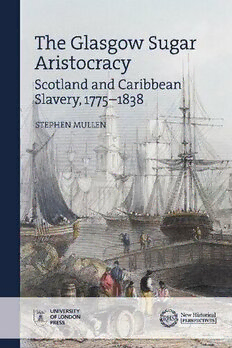
The Glasgow Sugar Aristocracy: Scotland and Caribbean Slavery, 1775–1838 PDF
Preview The Glasgow Sugar Aristocracy: Scotland and Caribbean Slavery, 1775–1838
The Glasgow Sugar Aristocracy New Historical Perspectives is a book series for early career scholars within the UK and the Republic of Ireland. Books in the series are overseen by an expert editorial board to ensure the highest standards of peer-reviewed scholarship. Commissioning and editing is undertaken by the Royal Historical Society, and the series is published under the imprint of the Institute of Historical Research by the University of London Press. The series is supported by the Economic History Society and the Past and Present Society. Series co-editors: Professor Elizabeth Hurren (University of Leicester) and Professor Heather Shore (Manchester Metropolitan University) Founding co-editors: Simon Newman (University of Glasgow) and Penny Summerfield (University of Manchester) New Historical Perspectives Editorial Board Professor Charlotte Alston Northumbria University Professor David Andress University of Portsmouth Dr Christopher Bahl Durham University Dr Milinda Banerjee University of St Andrews Dr Robert Barnes York St John University Dr Karin Bowie University of Glasgow Professor Catherine Clarke Institute of Historical Research, University of London Professor Neil Fleming University of Worcester Professor Ian Forrest University of Oxford Dr Emma Gallon University of London Press Professor Leigh Gardner London School of Economics Dr Sarah Longair University of Lincoln Dr Charlotte Wildman University of Manchester Dr Nick Witham University College London The Glasgow Sugar Aristocracy Scotland and Caribbean Slavery, 1775–1838 Stephen Mullen LONDON ROYAL HISTORICAL SOCIETY INSTITUTE OF HISTORICAL RESEARCH UNIVERSITY OF LONDON PRESS Published by UNIVERSITY OF LONDON PRESS SCHOOL OF ADVANCED STUDY INSTITUTE OF HISTORICAL RESEARCH Senate House, Malet Street, London WC1E 7HY © Stephen Mullen 2022 The author has asserted his right under the Copyright, Designs and Patents Act 1988 to be identified as the author of this work. This book is published under a Creative Commons Attribution- NonCommercial-NoDerivatives 4.0 International (CC BY-NC-ND 4.0) licence. More information regarding CC licences is available at https://creativecommons.org/licenses. Copyright and permissions for the reuse of many of the images included in this publication differ from the above. Copyright and permissions information is provided alongside each image. Available to download free or to purchase the hard copy edition at https://www.sas.ac.uk/publications. ISBNs 978-1-909646-77-3 (hardback edition) 978-1-912702-33-6 (paperback edition) 978-1-909646-93-3 (.epub edition) 978-1-909646-78-0 (.pdf edition) DOI 10.14296/fyax1274 Cover image: The Port of Glasgow (drawn and engraved by W. H. Bartlett and J. W. Appleton). Published in William Finden, The Ports, Harbours, Watering-Places and Coast Scenery of Great Britain (London, 1836–42). To my mother and father Contents List of illustrations ix List of tables xi List of abbreviations xiii Maps xv Acknowledgements xix Introduction 1 1. Emergence 29 2. Trade and commerce 57 3. A Glasgow-West India house 89 4. ‘Wanted, to serve in the West Indies’ 119 5. Jamaica 147 6. Grenada and Carriacou 183 7. Trinidad 211 8. Glasgow-West India ‘spheres of influence’: embedding the profits of Caribbean slavery 253 Conclusion 293 Appendix 303 Bibliography and manuscript sources 313 Index 347 vii List of illustrations 5.1 James Hakewill, Llanrumny estate, St Mary’s, Jamaica (1820–21) 151 6.1 The buildings of Maran estate in the island of Grenada (1822) 193 7.1 Richard Bridgens, ‘Protector of Slaves Office (Trinidad), c.1833’ 217 8.1 Marble busts of James Ewing of Strathleven (1775–1853) and James Buchanan (1785–1857) 255 ix
